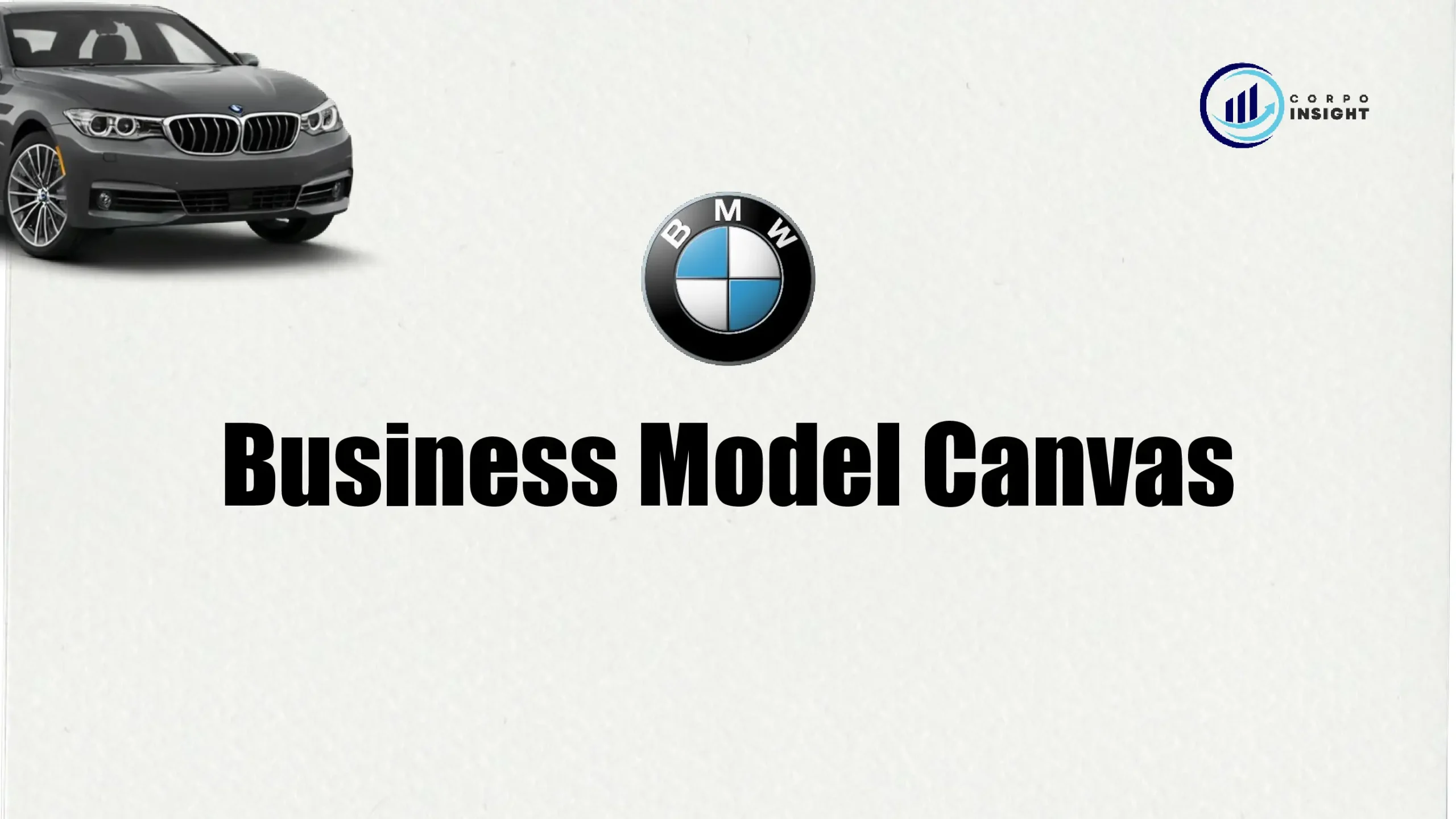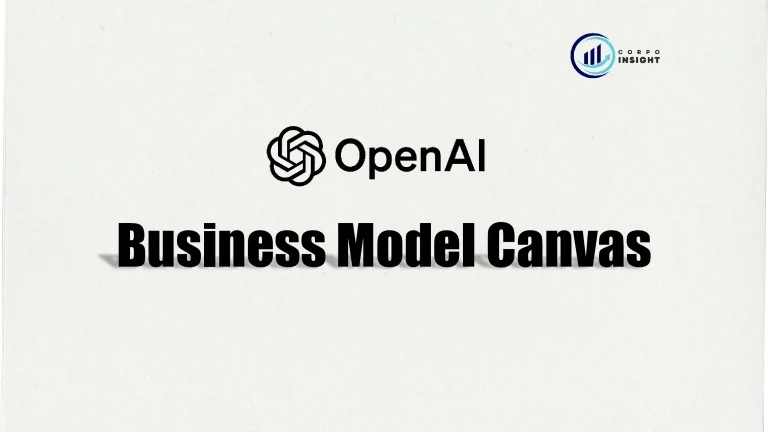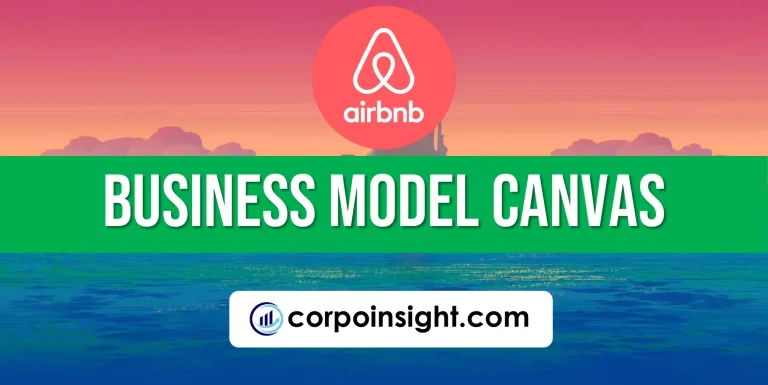BMW Business Model Canvas 2025
Though BMW began as an aircraft engine manufacturer in 1916, it evolved into a luxury automotive powerhouse renowned for its precision engineering and driver-focused philosophy. In this BMW Business Model Canvas, I will identify its customer segments, value proposition, revenue streams, channels, customer relationships, key activities, key resources, key partners, and cost structure.
Interesting fact!
During World War I, BMW supplied engines to the German military but had to disguise its factory as a laundry facility to avoid Allied bombing.
BMW Competitors
Mercedes-Benz | Audi | Porsche | Lexus | Tesla | Jaguar | Volvo | Cadillac | Genesis | Alfa Romeo
Customer Segments – BMW Business Model Canvas
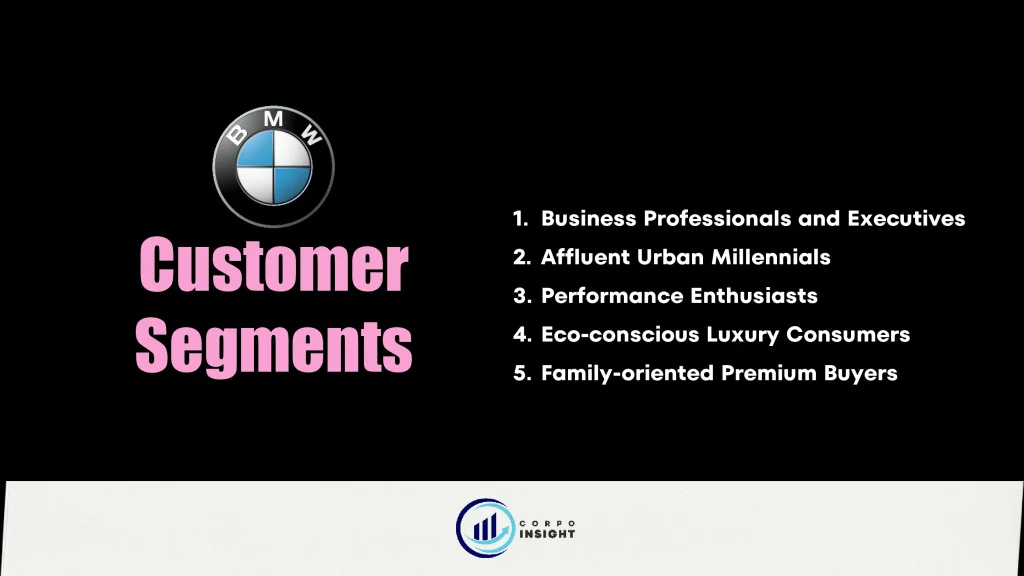
Business Professionals and Executives: As of 2024, approximately 45% of BMW’s customer base consists of high-ranking business professionals, with the BMW 5 Series and 7 Series being particularly popular among C-suite executives who prioritize both luxury and performance in their daily commute.
Affluent Urban Millennials: Recent market data shows a significant 32% increase in millennial BMW ownership since 2020, particularly in metropolitan areas, where young tech entrepreneurs and finance professionals gravitate toward the BMW X3 and 4 Series for their blend of status and sustainability.
Performance Enthusiasts: The M Division continues to capture the hearts of driving purists, with BMW M2 and M3 models experiencing a 28% sales growth in 2023, appealing to both track-day enthusiasts and collectors who value the brand’s motorsport heritage.
Eco-conscious Luxury Consumers: With the success of the all-electric BMW i4 and iX models, which saw a 67% year-over-year growth in 2023, BMW has successfully attracted environmentally conscious professionals who refuse to compromise on luxury while pursuing sustainability.
Family-oriented Premium Buyers: The X5 and X7 models dominate the luxury SUV segment, particularly among suburban families with household incomes exceeding $200,000, who prioritize safety features and spacious interiors without sacrificing the prestigious brand image.
Value Proposition – BMW Business Model Canvas
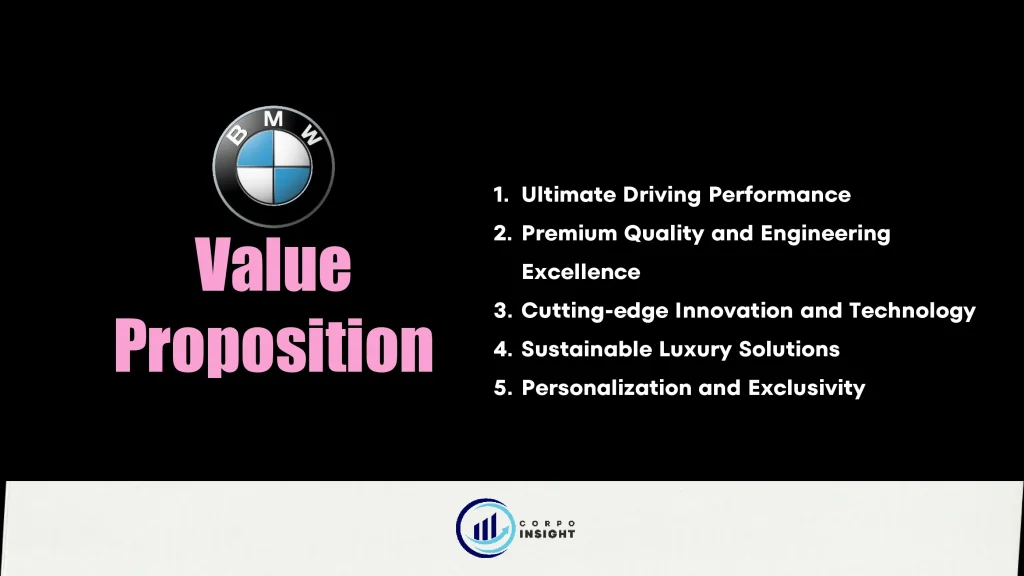
Ultimate Driving Performance: BMW’s commitment to dynamic driving excellence is exemplified through its latest M models, which incorporate advanced chassis technology and powerful engines, such as the 2024 M3 CS that accelerates from 0-60 mph in just 3.2 seconds.
Premium Quality and Engineering Excellence: The brand’s dedication to superior craftsmanship is evident in its industry-leading 2023 reliability ratings, where BMW ranked among the top three luxury manufacturers, with models like the 5 Series achieving a 92% customer satisfaction rate.
Cutting-edge Innovation and Technology: BMW’s latest iDrive 8.5 system and driver assistance features, implemented across their 2024 lineup, showcase their technological prowess, while their revolutionary E-ink color-changing technology on the i Vision Dee concept demonstrates their innovative spirit.
Sustainable Luxury Solutions: Through their expanding electric vehicle portfolio, which saw a 112% growth in 2023, BMW combines environmental responsibility with luxury, offering vehicles like the i4 and iX that deliver impressive ranges exceeding 300 miles while maintaining premium comfort.
Personalization and Exclusivity: BMW’s Individual program, which experienced a 40% increase in customer uptake during 2023, allows discerning clients to create bespoke vehicles with over 150 exterior colors and numerous interior customization options.
Revenue Streams – BMW Business Model Canvas
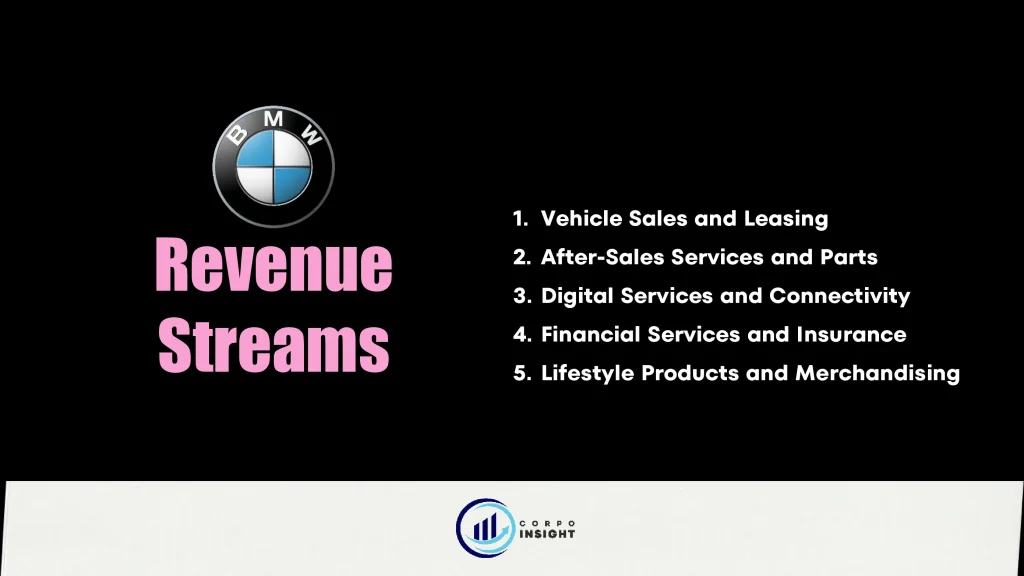
Vehicle Sales and Leasing: BMW’s core revenue stream generated €102.8 billion in 2023 through new vehicle sales, with the X series SUVs contributing 45% of total sales, while their leasing program, BMW Financial Services, facilitated 34% of all new vehicle acquisitions.
After-Sales Services and Parts: The company’s after-sales division contributed €22.3 billion in 2023 through maintenance services, genuine parts sales, and extended warranty programs, while their digital service booking platform increased service appointments by 28% year-over-year.
Digital Services and Connectivity: BMW’s connected car services and digital features, including the BMW ConnectedDrive and premium feature subscriptions, generated €3.2 billion in 2023, representing a substantial 65% growth compared to the previous year.
Financial Services and Insurance: BMW Financial Services not only provides vehicle financing but also generates €2.9 billion through comprehensive insurance packages, gap coverage, and other financial products, showing a 15% increase from 2022.
Lifestyle Products and Merchandising: The BMW lifestyle collection, including branded merchandise, accessories, and exclusive collaboration products, contributed €850 million to revenue in 2023, with online sales through their digital platform growing by 42%.
Channels – BMW Business Model Canvas
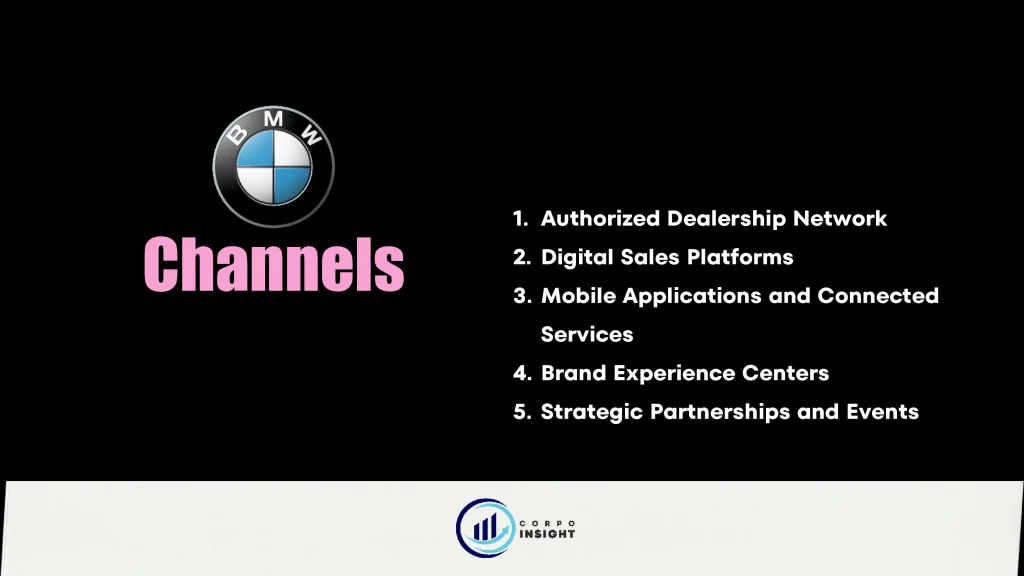
Authorized Dealership Network: BMW’s global network of 3,500+ authorized dealerships, which underwent a 12% digital transformation in 2023, serves as the primary sales channel, with showrooms featuring virtual reality configurations and interactive displays that enhanced customer engagement by 45%.
Digital Sales Platforms: The BMW online retail platform, launched globally in 2021, witnessed a 78% increase in digital transactions during 2023, allowing customers to configure, purchase, and arrange delivery of vehicles while integrating seamlessly with physical dealerships for a hybrid sales experience.
Mobile Applications and Connected Services: The MyBMW app, boasting 5.2 million active users in 2023, serves as a crucial channel for service bookings, remote vehicle management, and feature activation while facilitating direct communication between customers and BMW services.
Brand Experience Centers: BMW Welt in Munich and similar experience centers worldwide attracted 3.1 million visitors in 2023, combining product showcases, interactive exhibits, and delivery experiences while serving as important channels for brand immersion and customer education.
Strategic Partnerships and Events: BMW’s presence at major auto shows, motorsport events, and collaborative ventures with tech companies reached 25 million potential customers in 2023, while partnerships with luxury hotels and airports created exclusive touchpoints for premium clientele.
Customer Relationships – BMW Business Model Canvas
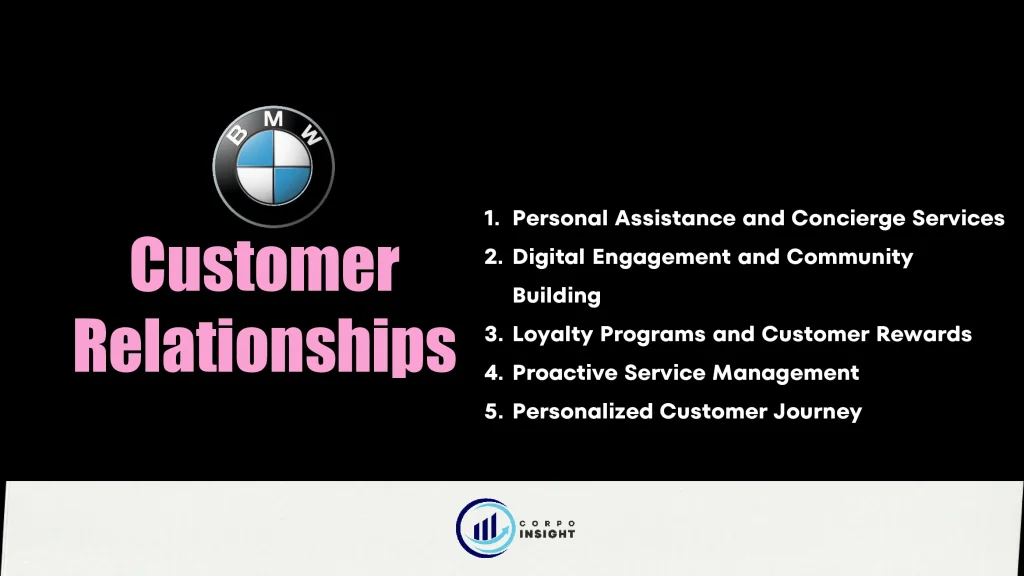
Personal Assistance and Concierge Services: BMW’s dedicated personal assistants, available through their Excellence Program launched in 2023, serve over 100,000 premium customers worldwide, offering 24/7 support and exclusive benefits, while maintaining a remarkable 96% customer satisfaction rate.
Digital Engagement and Community Building: The BMW Connected App ecosystem, which grew by 2.1 million users in 2023, fosters continuous interaction through personalized vehicle insights, while the BMW Social Community platform connects 8.5 million enthusiasts worldwide through events and forums.
Loyalty Programs and Customer Rewards: The BMW Inside Edge program, expanded in 2023, rewards loyal customers with exclusive experiences and benefits, resulting in a 28% increase in customer retention, while the BMW Elite Driver program offers track days and advanced driving courses.
Proactive Service Management: Through AI-powered predictive maintenance alerts and over-the-air updates, BMW maintained relationships with 89% of their customer base in 2023, while their Digital key-sharing feature strengthened family connections to the brand.
Personalized Customer Journey: BMW’s AI-driven CRM system, implemented across 45 markets in 2023, creates tailored experiences throughout the ownership lifecycle, resulting in a 34% increase in customer engagement and a 23% rise in repeat purchases.
Key Activities – BMW Business Model Canvas
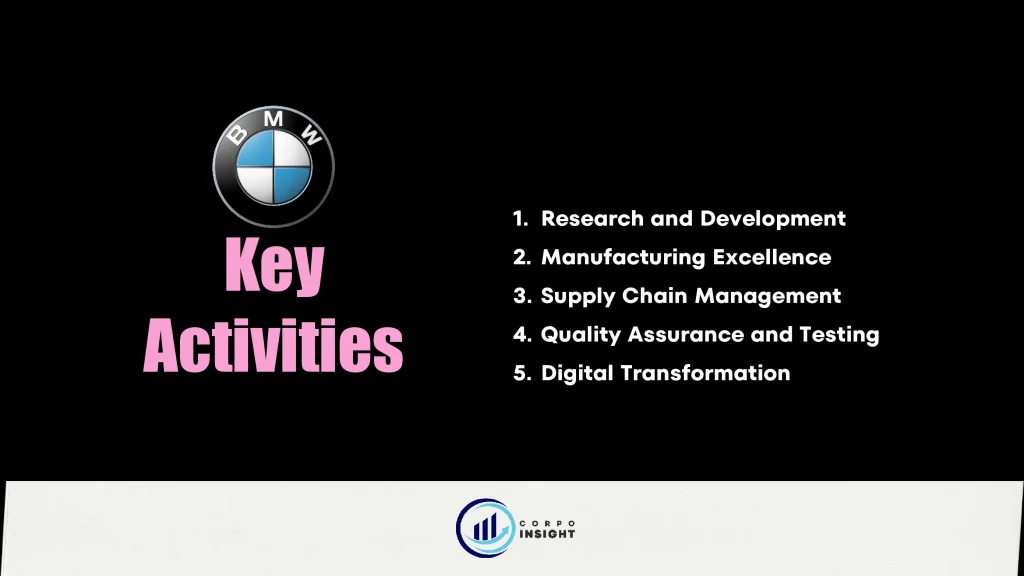
Research and Development: BMW invested €6.8 billion in R&D during 2023, focusing on electric mobility and autonomous driving technology, while their innovation hub in Silicon Valley collaborated with 200+ tech startups to develop cutting-edge solutions for future mobility challenges.
Manufacturing Excellence: Operating 31 production facilities across 15 countries, BMW produced 2.4 million vehicles in 2023, with their state-of-the-art Leipzig plant achieving 75% automation and reducing carbon emissions by 40% through innovative production processes.
Supply Chain Management: BMW’s connected supply chain network, involving 12,000 suppliers across 70 countries, utilized blockchain technology and AI forecasting in 2023 to achieve a 92% on-time delivery rate while reducing logistics costs by 15%.
Quality Assurance and Testing: Through rigorous testing protocols at their €200 million Quality Center in Munich, opened in 2023, BMW conducts over 40,000 individual tests per vehicle model, ensuring exceptional quality standards across their entire product range.
Digital Transformation: BMW’s agile development teams completed 300+ digital projects in 2023, including the enhancement of their iDrive system and the implementation of over-the-air updates, which reduced software-related issues by 45% across their vehicle lineup.
Key Resources – BMW Business Model Canvas
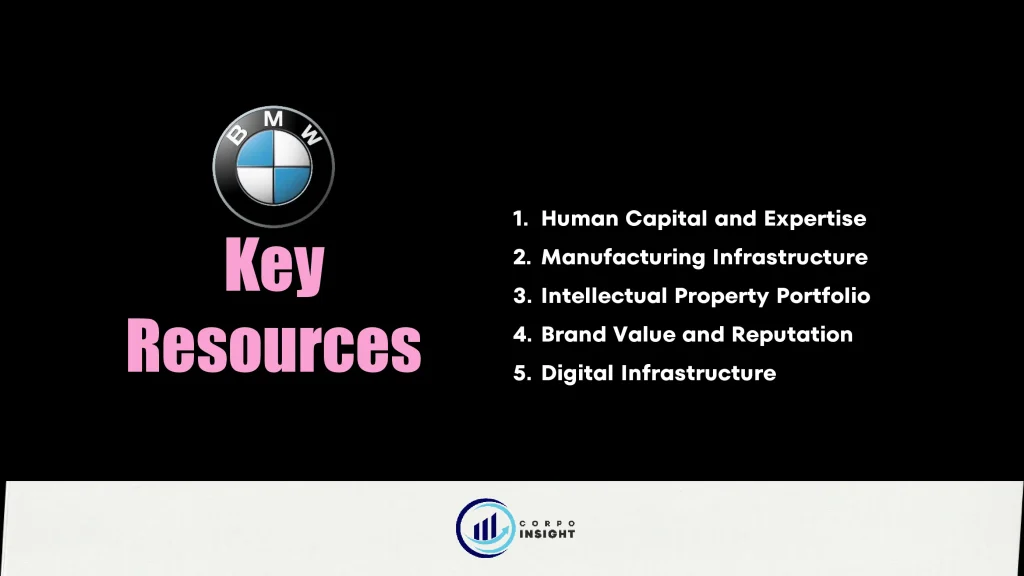
Human Capital and Expertise: BMW employs over 118,000 skilled professionals worldwide, including 15,000 engineers and 2,000 AI specialists, while their talent development program invested €280 million in 2023 to enhance technical capabilities and foster innovation across all departments.
Manufacturing Infrastructure: The company’s global production network, valued at €25 billion, includes state-of-the-art facilities like the Spartanburg plant, which received a €1.7 billion upgrade in 2023 for electric vehicle production and advanced robotics implementation.
Intellectual Property Portfolio: BMW’s extensive IP portfolio encompasses 15,000+ active patents, with 2,800 new innovations registered in 2023 alone, while their revolutionary battery technology and autonomous driving systems represent crucial competitive advantages in the evolving automotive landscape.
Brand Value and Reputation: As the world’s most valuable premium automotive brand, valued at €46.7 billion in 2023, BMW’s reputation for excellence is supported by its heritage collection of 1,400 historic vehicles and a brand loyalty rate of 74%.
Digital Infrastructure: BMW’s cloud-based technological ecosystem, powered by 50,000 servers and processing 25 petabytes of data daily, enables seamless connectivity across their operations while supporting advanced features like predictive maintenance and autonomous driving capabilities.
Key Partners – BMW Business Model Canvas
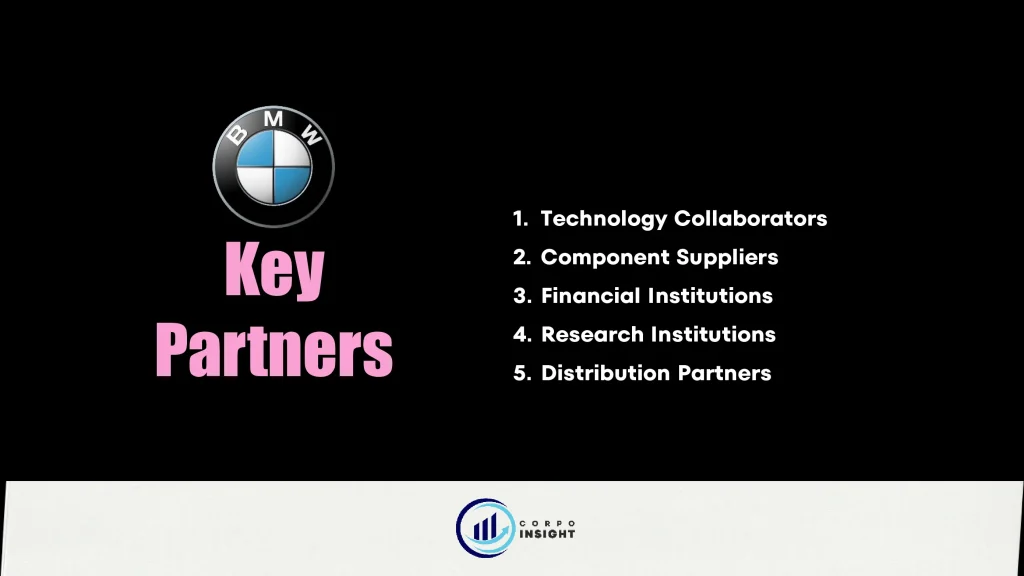
Technology Collaborators: BMW’s strategic partnership with Microsoft and NVIDIA, strengthened by a €2.5 billion investment in 2023, focuses on autonomous driving development and cloud computing solutions, while their collaboration with Samsung has advanced battery technology for their electric vehicles.
Component Suppliers: The company maintains robust relationships with key suppliers like Bosch, ZF Friedrichshafen, and Continental, who collectively provide 65% of BMW’s critical components, while their joint venture with SGL Carbon ensures exclusive access to carbon fiber materials.
Financial Institutions: BMW Financial Services partners with global banks and insurance providers, including Deutsche Bank and Allianz, managing €140 billion in assets during 2023, while facilitating vehicle financing options that contributed to 38% of total sales.
Research Institutions: Collaborations with 250 universities and research centers worldwide, supported by €800 million in joint funding for 2023, drive innovation in areas such as artificial intelligence and sustainable mobility while providing access to emerging technological breakthroughs.
Distribution Partners: BMW’s network of 3,500+ independent dealerships, complemented by partnerships with luxury hotel chains and premium car-sharing services, generated €89 billion in retail sales while maintaining a customer satisfaction rate of 92% in 2023.
Cost Structure – BMW Business Model Canvas
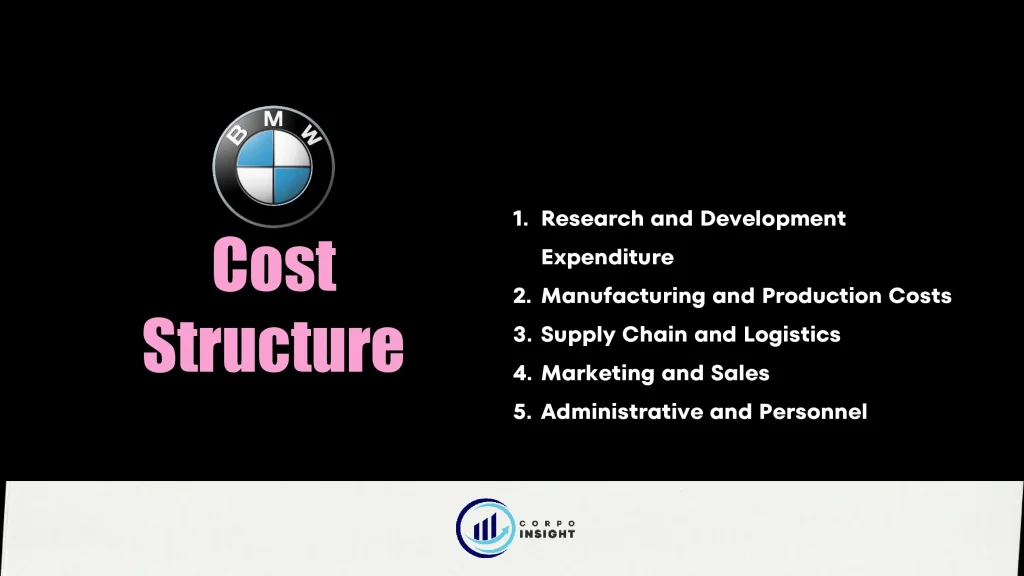
Research and Development Expenditure: BMW allocated €6.8 billion to R&D in 2023, with 40% dedicated to electric vehicle development and autonomous driving technology, while their investment in AI and digital innovation projects consumed an additional €2.1 billion of the total budget.
Manufacturing and Production Costs: The company’s production expenses reached €45.2 billion in 2023, encompassing raw materials, labor, and energy costs, while their transition to smart manufacturing technologies required a €3.4 billion investment but reduced operational costs by 15%.
Supply Chain and Logistics: BMW’s global supply chain operations incurred €12.3 billion in 2023, including transportation, warehousing, and inventory management costs, while their investment in blockchain technology and predictive analytics improved efficiency by 22%.
Marketing and Sales: The company invested €4.7 billion in marketing activities during 2023, combining traditional advertising with digital campaigns, while dealer support programs and customer experience initiatives required an additional €2.1 billion to maintain market competitiveness.
Administrative and Personnel: Employee-related expenses totaled €18.5 billion in 2023, covering salaries, benefits, and training programs, while infrastructure maintenance and IT systems operations required €3.8 billion to support BMW’s global operations and digital transformation initiatives.
Summary of BMW Business Model Canvas
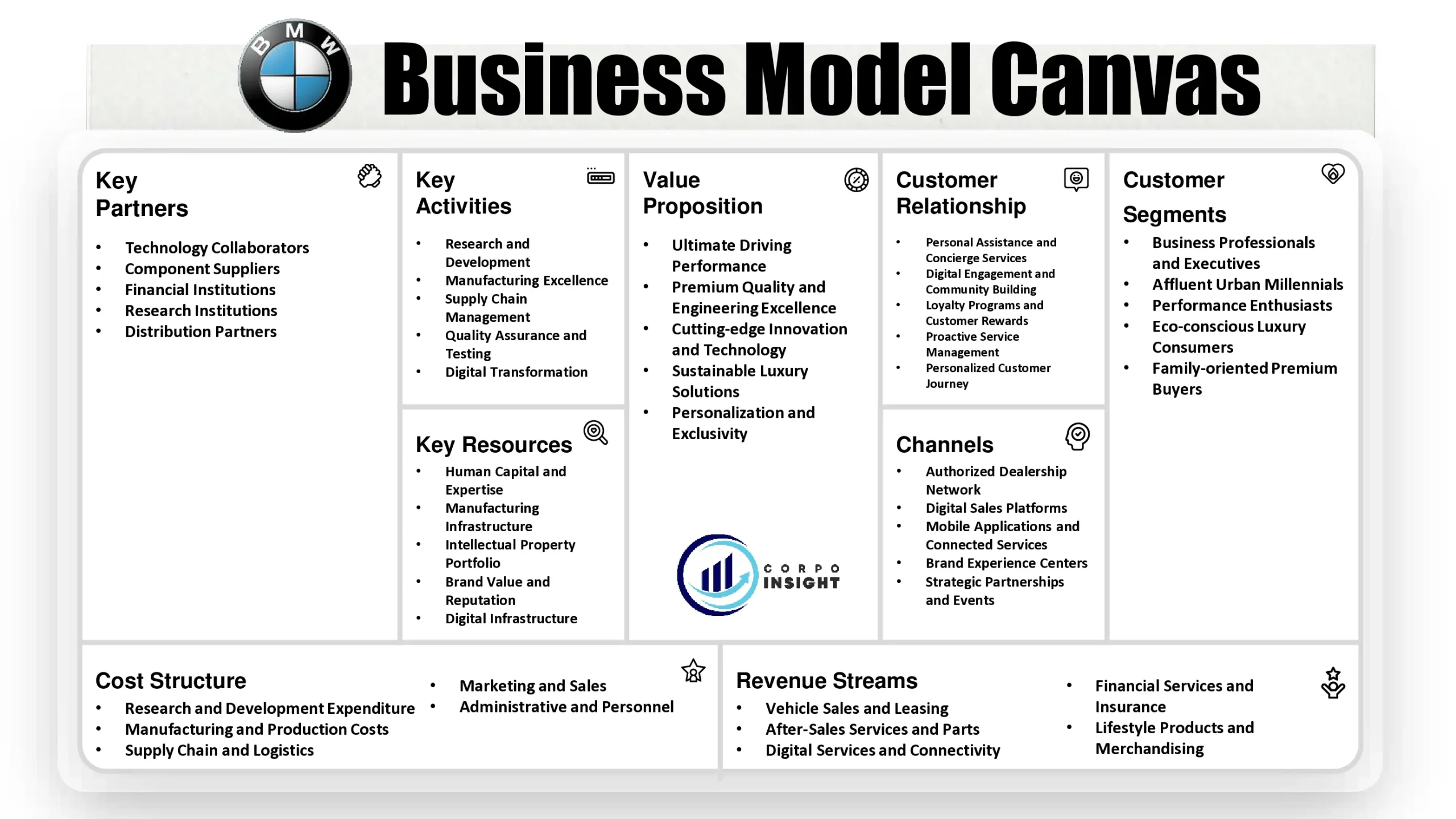
Conclusion on BMW Business Model Canvas
BMW’s business model canvas demonstrates a robust and forward-thinking approach, where premium positioning meets technological innovation and sustainability. Through substantial investments in R&D, strategic partnerships, and digital transformation, BMW maintains its competitive edge while adapting to industry changes. Their focus on customer-centricity, coupled with diversified revenue streams and efficient cost management, ensures long-term sustainability and market leadership in the luxury automotive segment.

Majoring in marketing from Bangladesh University of Professionals, Sadman Abrar is a learner, obsessed with branding and intrigued to learn about different company strategies, and currently working at bKash.

